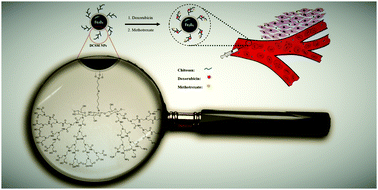Dendritic chitosan as a magnetic and biocompatible nanocarrier for the simultaneous delivery of doxorubicin and methotrexate to MCF-7 cell line
Abstract
The application of doxorubicin (DOX) and methotrexate (MTX) delivery, like other anticancer drugs, is limited by insufficient targeting to cancerous tissue cells. The development of smart, biocompatible, and magnetic nanocarriers capable of carrying the anticancer drugs into the cells and releasing them under cancerous tissue conditions could increase the efficacy of the anticancer drugs currently in use. In this study, novel dendritic chitosan coated silica magnetic nanoparticles (DCSM NPs) were developed with the aim of achieving simultaneous intracellular delivery of DOX and MTX, two different common anticancer drugs. The 3.5th generation of DCSM NPs prepared in this study contain a lot of surface amino and carboxylic acid groups which allow them to be useful as magnetic nanocarriers for a drug delivery system (DDS). The synthesized nanoparticles (NPs) were characterized and validated step by step using FTIR, SEM, EDX, VSM, XRD, DLS and zeta potential analysis methods. DOX and MTX, as model anticancer drugs, were loaded effectively onto the magnetic nanocarrier through electrostatic interactions with high loading efficiencies (99.07% and 98.92%, respectively) due to the presence of a high content of amine and carboxylic acid groups. Drug release studies confirmed that DOX@MTX@nanocarrier is a suitable candidate for cancer treatment because it maintains a low drug release in the simulated blood stream under physiological conditions (pH 7.4) while having a high drug release rate under cancerous conditions (pH 5.4 and 4.0). We hypothesize that the co-delivery of DOX with MTX could act synergistically to increase their treatment efficacy and reduce their toxic side effects. The cytotoxicity assay of a blank nanocarrier to MCF7 cell lines indicated that the 3.5th generation of DCSM NPs were suitable as anticancer drugs nanocarriers. On the other hand, the DOX@MTX@nanocarrier had an efficient anticancer performance, as confirmed by MTT assay, DAPI staining, cellular uptake, cell cycle, and real-time PCR analysis compared to free dual anticancer drugs (DOX–MTX). The hemolysis assay results showed that the nanocarrier has negligible hemolytic effects on human red blood cells (HRBCs) and also has good biocompatibility. The results of our study showed that the 3.5th generation of DCSM NPs could be effectively used in the targeted delivery of DOX and MTX to cancerous tissues and for further in vivo uses.



 Please wait while we load your content...
Please wait while we load your content...